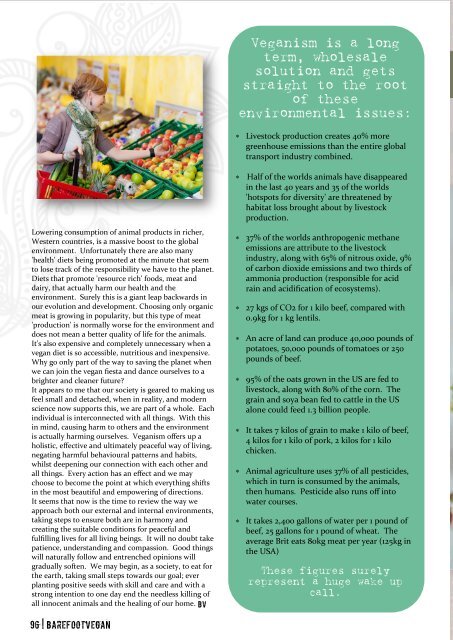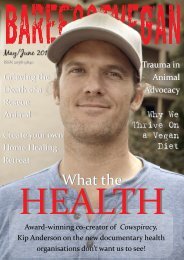barefoot vegan sept_oct issue.pdf
- No tags were found...
You also want an ePaper? Increase the reach of your titles
YUMPU automatically turns print PDFs into web optimized ePapers that Google loves.
Veganism is a long<br />
term, wholesale<br />
solution and gets<br />
straight to the root<br />
of these<br />
environmental <strong>issue</strong>s:<br />
Livestock production creates 40% more<br />
greenhouse emissions than the entire global<br />
transport industry combined.<br />
Half of the worlds animals have disappeared<br />
in the last 40 years and 35 of the worlds<br />
'hotspots for diversity' are threatened by<br />
habitat loss brought about by livestock<br />
production.<br />
Lowering consumption of animal products in richer,<br />
Western countries, is a massive boost to the global<br />
environment. Unfortunately there are also many<br />
'health' diets being promoted at the minute that seem<br />
to lose track of the responsibility we have to the planet.<br />
Diets that promote 'resource rich' foods, meat and<br />
dairy, that actually harm our health and the<br />
environment. Surely this is a giant leap backwards in<br />
our evolution and development. Choosing only organic<br />
meat is growing in popularity, but this type of meat<br />
'production' is normally worse for the environment and<br />
does not mean a better quality of life for the animals.<br />
It's also expensive and completely unnecessary when a<br />
<strong>vegan</strong> diet is so accessible, nutritious and inexpensive.<br />
Why go only part of the way to saving the planet when<br />
we can join the <strong>vegan</strong> fiesta and dance ourselves to a<br />
brighter and cleaner future?<br />
It appears to me that our society is geared to making us<br />
feel small and detached, when in reality, and modern<br />
science now supports this, we are part of a whole. Each<br />
individual is interconnected with all things. With this<br />
in mind, causing harm to others and the environment<br />
is actually harming ourselves. Veganism offers up a<br />
holistic, effective and ultimately peaceful way of living,<br />
negating harmful behavioural patterns and habits,<br />
whilst deepening our connection with each other and<br />
all things. Every action has an effect and we may<br />
choose to become the point at which everything shifts<br />
in the most beautiful and empowering of directions.<br />
It seems that now is the time to review the way we<br />
approach both our external and internal environments,<br />
taking steps to ensure both are in harmony and<br />
creating the suitable conditions for peaceful and<br />
fulfilling lives for all living beings. It will no doubt take<br />
patience, understanding and compassion. Good things<br />
will naturally follow and entrenched opinions will<br />
gradually soften. We may begin, as a society, to eat for<br />
the earth, taking small steps towards our goal; ever<br />
planting positive seeds with skill and care and with a<br />
strong intention to one day end the needless killing of<br />
all innocent animals and the healing of our home. BV<br />
37% of the worlds anthropogenic methane<br />
emissions are attribute to the livestock<br />
industry, along with 65% of nitrous oxide, 9%<br />
of carbon dioxide emissions and two thirds of<br />
ammonia production (responsible for acid<br />
rain and acidification of ecosystems).<br />
27 kgs of CO2 for 1 kilo beef, compared with<br />
0.9kg for 1 kg lentils.<br />
An acre of land can produce 40,000 pounds of<br />
potatoes, 50,000 pounds of tomatoes or 250<br />
pounds of beef.<br />
95% of the oats grown in the US are fed to<br />
livestock, along with 80% of the corn. The<br />
grain and soya bean fed to cattle in the US<br />
alone could feed 1.3 billion people.<br />
It takes 7 kilos of grain to make 1 kilo of beef,<br />
4 kilos for 1 kilo of pork, 2 kilos for 1 kilo<br />
chicken.<br />
Animal agriculture uses 37% of all pesticides,<br />
which in turn is consumed by the animals,<br />
then humans. Pesticide also runs off into<br />
water courses.<br />
It takes 2,400 gallons of water per 1 pound of<br />
beef, 25 gallons for 1 pound of wheat. The<br />
average Brit eats 80kg meat per year (125kg in<br />
the USA)<br />
These figures surely<br />
represent a huge wake up<br />
call.<br />
96 | BarefootVegan





